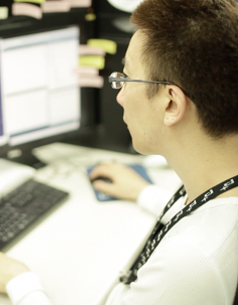(Continues from Part 1.)
Pursuing a Creative Ideal
I programmed by myself for the first time when I was in around the fourth grade of elementary school. It all began when I started playing around with the educational programming software called “Family BASIC”. But of course, being an elementary schooler, I couldn’t comprehend programming. At the time, I bought a monthly programming magazine and just typed in whatever was written in it. Of course, sometimes it didn’t work even when I typed it in, so I checked every character one-by-one to fix my mistakes. Re-typing that over and over again, I naturally learned how to program. Later on, for example, when I learned about one-point perspective in a high school class, I went home and made a 3D dungeon. I applied the rules I had learned and drew lines on the screen, and made it so that I could move around using the keyboard. I really enjoyed this type of amusement, because I just created things to satisfy myself. I didn’t have any grand goals in mind.
There are two pieces of shared understanding among programmers, and the first one is that the computer is never wrong. Unless it’s actually broken, the reason the computer isn’t doing what you want is within yourself. Programmers don’t just think this way about computers – it forms the basis of the way we think about life. When a problem happens, we make sure to question ourselves before looking for the cause in the outside world. The second one is that programmers are basically patient. By that I mean that programmers can’t create anything just by ourselves. For example, we can’t work without game designers to come up with the game design, or graphic designers to create graphics. The position of a programmer is to receive requests from all the different groups and respond to them in the best way possible. If that doesn’t go well, it’s our fault. While handling a large workload, we need to continually respond to requests, add our own flavor to the content, and finally remove bugs.
 This isn’t just about programmers, but I think it’s extremely important to be aware of your own deficiencies. If you know your ideals, and the things you’re aiming for, you can make the effort to approach them. If you want to become a decent programmer, you need to go through the disciplined training of polishing the programming into a final form, as well as reflecting that in the actual product. This is something you acquire through tens of thousands of repetitions of putting together a program and then testing it. Because of this, if you want to live on your programming skills, if you want to make games fun, you need to cultivate your sensibilities and be interested in everything. It’s meaningless if you can’t maintain your interest. Especially at PlatinumGames, everyone is expected to be like this. That sounds like a high bar, but I believe that’s why we are able to create high-quality, deep games.
This isn’t just about programmers, but I think it’s extremely important to be aware of your own deficiencies. If you know your ideals, and the things you’re aiming for, you can make the effort to approach them. If you want to become a decent programmer, you need to go through the disciplined training of polishing the programming into a final form, as well as reflecting that in the actual product. This is something you acquire through tens of thousands of repetitions of putting together a program and then testing it. Because of this, if you want to live on your programming skills, if you want to make games fun, you need to cultivate your sensibilities and be interested in everything. It’s meaningless if you can’t maintain your interest. Especially at PlatinumGames, everyone is expected to be like this. That sounds like a high bar, but I believe that’s why we are able to create high-quality, deep games.
(Continues to Part 3.)
interview by editorial studio MUESUM (2012/07/13)